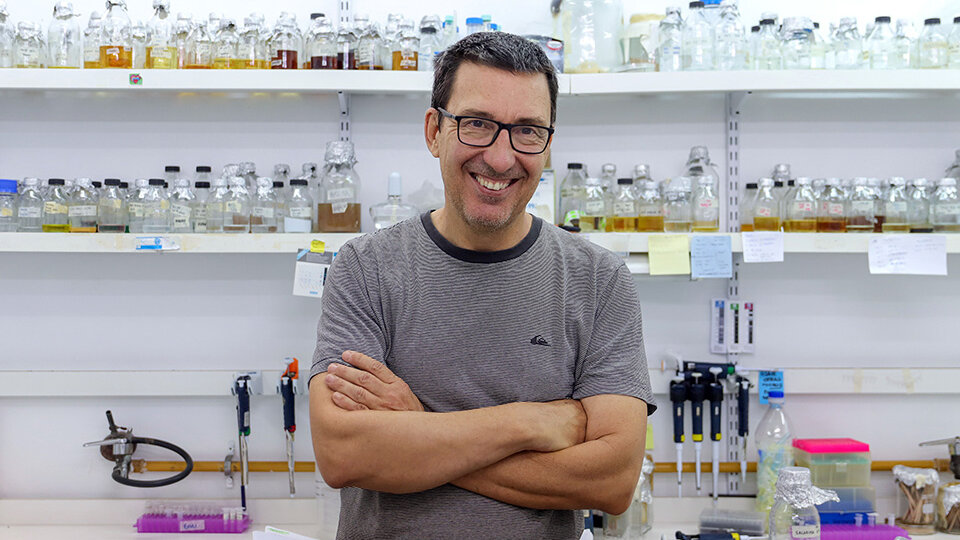IBR (Conicet-UNR) researcher Christian Magni has received the “Innovar” award of the National Innovation Competition 2023 from the Ministry of Science and Technology, which honors those who dare to invent, design and develop products and services in the country. His project “Development of an Oral Vaccine against Avian Influenza” was selected as second place in the “Food” section and was recognized by INTI and INTA.
The vaccine is proposed because the industry is currently threatened by an epidemic of avian influenza, a highly contagious disease that can cause severe illness and death in infected birds. A key solution to this problem is mass vaccination of birds to provide immunity to the virus and prevent the spread of disease on poultry farms.
The project led by Magni involves developing the vaccine using a bacterium called Lactococcus lactis. In this process, engineering aims to generate and deliver viral antigens conjugated with highly effective adjuvants. It is administered orally to animals through feed or water, thereby stimulating an immune response in the bird’s gastrointestinal tract.
The microorganisms chosen to design the vaccine are “considered safe for human consumption and are widely used as starter cultures for industrial fermentation of dairy products,” said the biotech PhD, adding that in recent decades there has been growing interest in their use in Use in production has generated strong interest. Research on therapeutic proteins and development of recombinant vaccines.
innovation system
Magny explained that flu vaccine production generally involves traditional methods such as using embryonated chickens, developing inactivated viruses, using mutant viruses, or producing recombinant vaccines. All of these require purification steps and the formulation requires the production of adjuvants, preservatives and stabilizers. These steps make production difficult, time and money consuming.
Likewise, in the case of injectable vaccines, in the case of automatic egg injectors, there are requirements for specialized personnel, storage, administration time, and stress to the birds or egg rupture.
On the other hand, “This prototype constitutes a novel production system developed entirely from non-pathogenic bacteria and can be safely consumed directly by birds, which guarantees their immunity worldwide,” he insists. Professors from UNR’s food biotechnology program assured that the production process is simple and that there are factories in the country capable of producing these microorganisms.
The microorganisms must then be induced so that antigens and adjuvants can be loaded onto them and administered in the form of poultry feed preparations. Eventually, they could be administered in other forms, such as sprays, thick drops or egg injections. Therefore, “the simplicity of development, ease of administration, protection and reduction in production costs compared to other vaccine systems currently on the market are also novel data,” he stressed.
The advantages of vaccinating birds are currently being discussed in Europe and the United States. In other words, promoting national development of the production of such drugs is of high significance.
Advantages of oral vaccines
The researchers mentioned that one of the benefits of the avian influenza vaccine is to prevent the spread of the virus in the poultry industry, reducing losses from animal losses (slaughter and mortality of birds) and damage to food (eggs and meat). .
In addition, it can reduce the spread of avian influenza and the number of outbreaks by controlling the spread of the virus between farms (production damage) and reducing wild hosts (environmental damage). Finally, reduce the risk of transmission to workers and its impact on public health, thereby reducing the potential for transmission to the general population.
The fact that this oral vaccine can be administered by direct ingestion or mixed with food or water simplifies the process compared to injectable vaccines: it does not require needles or trained personnel, reducing the need for such interventions (such as breaking eggs) damage caused. injury or infection, and eliminate the stress and negative changes in animal welfare caused by needle intervention.
Also, given the number of chickens on a commercial farm, it can be less time consuming and cheaper than an automatic egg injector on a medium or small production farm.
“The efficacy and safety of oral vaccines provide significant operational advantages in terms of ease of administration, broad coverage, reduced bird stress, reduced application time and cost, and reduced risk of injury and adverse reactions,” he maintained.
On the other hand, this vaccine prototype will improve transport and logistics conditions in different parts of the world, where the development of the poultry industry is important for food production.
“Given the potential for transmission of this virus to mammals and the general population, having advanced and easily scalable systems in place in the event of a health emergency is a top priority for disease control organizations,” he explained. Rosary/12.
It also highlights that the platform is versatile as it can be applied to different variants of the virus. It doesn’t just apply to chickens, but to other livestock, and possibly even humans.

